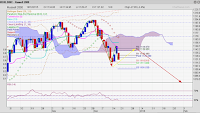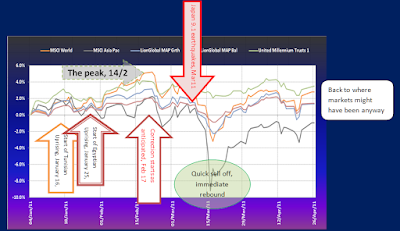Japan Part Two - A Parameter-Changing Event!
'Seemingly intimidating' is what we might call the situation we find ourselves in over the last few weeks, confronted by suitably frightening details, snippets of truth and media frenzy.
Rather than adding to it, I prefer reducing the noise: Already 'ignoring' any impact from the earthquake in Christchurch, New Zealand, or the triple aspect calamity in Japan, rather referring to it as a single event.
What I wanted to research and highlight in this report is how a multitude of challenges could impact
a) on the welfare of the global economy
b) on the stock market outlook
over the coming months.
3-in-1, at least...
- Rebuilding Japan's earthquake stricken prefectures and stabilising its nuclear reactors are the main tasks in the short term to medium term. The tasks are complex, but not without precedent with many liking it to the period after the atom bomb hit Hiroshima and Nagasaki in August 1945.
- I don't purport to provide answers on how to solve the Middle East crisis, as the more tangible answers lie on the negotiating tables behind the closed doors of the UNO.
- Lastly, and probably the most daunting of aspects, the PIIGS debt crisis will require more than mere advice, or money, or negotiating skills to find a solution that resets the goal posts (VERY NECESSARY) in the face of critical malfunction in the EU zone.
Rights & Wrongs
In a recent interview with iFAST, (click to view) I answered the question on what the biggest risks for 2011 are, stating "political error and misjudgement as major concerns". Economies and stock markets usually find their way back into form. However, wrong decisions by our leaders - and others - have a way of haunting us for much longer. This time round - thankfully, errors appear to be but a few:
In Japan...
- Japan does all it can - in an almost superhuman fashion. They could ask for more outside help. Acros the globe, the general willingness is overwhelming.
In North Africa
- Tunisia and Egypt resolved into potentially 'freer, more democratic' states rather more gently than expected, - if anyone expected it at all! I am not assuming that the process is complete, nor do I expect it to complete in the shortest of times. It is 'OK' to evolve gradually.
- As was to be expected (and should not - or will not - get out the headlines for probably some years even), the second wave of tackling the more hardened structures of other Arab nations needs a great deal more pushing power. Here the error lies with the European nations, which despite centuries of living side by side with Muslim nations, simply have little idea of its values, drivers and synergies. let alone appreciate them. The simple answer to 'follow universal human values' - mildly put - creates misfits, developing into imagined obstructions and irrelevant solutions. But it could also be interpreted as arrogance, ignorance, and disrespect.
- During the Libyan uprising, the errors are more frequent, allowing a ruthless leader to torment its people, while the world dithers with a suitable response. When it finally comes, it is a last minute scramble, followed by squabbling over whose supposed to do what, - and what not. That it was the French, who lunged into the first strike, could be a sign that they are emotionally closer to the heartfelt cry of help from Benghazi than its other European compatriots.
- One error that irks me is that the world has allowed Gaddafi take up the posture he loves best. He relishes the fight, revels in his role as the last martyr, "fighting off the onslaught of the infidel crusaders". The fight is not about ideology, or a bad regime, rather about liberating minds and hearts. A different strategy, one that knows about the desires of the Libyan people, could have shortened the period of transition, which as of now is still undefined.
- If the western ignorance does not diminish swiftly, more complex issues will come to the fore in countries where Western companies', and other interests are more prominent.
- What has worked well, is that topics like 'oil interests' and the 'Palestine issue', were not raised, - thus helping the people seek the political and social solutions they want rather than being dragged into power struggles of international proportions. As it is, I view the events in the Arab world as a regional force for change. Already spreading into Bahrain, Yemen, Syria, with initial signs also in Saudi Arabia and Jordan, the phenomenon will continue expanding to other regions as and when the accompanying ideology becomes more encompassing and of wider,- pressing interest to others.
Europe & Its Debt Crisis
- For more than a year now of sifting through the wreckage in the aftermath of the 2008 financial debacle, the Europeans remain unclear, or at least, - at odds with each other in a North-South confrontation -, as to how to reorganise a better system in dealing with the fiscally less astute members of the Euro-club.
- It is of immense importance that the battle is won, even if one or two states suffer the misery of default with all the consequences, politically and socially. Potential solutions are continuously pushed forward, dissected, reassessed to give optimal chances for a successful outcome. It seems unimaginable that there would be many who are seeking a disintegration of the EU zone and its Euro currency.
- Putting blame or finding fault may be ambiguous, even unhelpful as the conditions for the difficulties stem from previously 'accepted' parameters of dealing with debt.
- What does pose strains now are currency fluctuations, making a quick and easy solution impossible. More strains are visible in the mood of people, fearing a worst case scenario. Political skill therefore will almost solely decide the way out of this debacle.
Where does this leave the investor?
 |
| On the leftL cyclical outline of stock narkets insce 2008. On the right, the DJIA from March 2008 to March 2011 |
The DJIA and accompanying cyclical charting appear totally in sync up to the blue ticks. Indeed the rise into August 2010 is about as accurate as you can expect. Then follows a period of disassociation, which as I explained at the time, is entirely due to QE II, pretty much a repeat of the effect of QE I in 2009. With the added liquidity financial markets ignored the appearing downside pull and instead moved north. By the time we got into December 2010, market failed to produce the significant pull back we expected, apart from a token correction in November.
There, markets appear to be returning to an outline mirroring the general cycles chart, - but at a significantly higher level. I stated at the time, that I was suspiciou of such an overextension of prices beyond the cycles and that sooner or later, markets will likely correct the inconsistency one way or another.
To the point, here is research data for the DJIA:
Projected Actual
Dec 2010: projected 8500 / actual 10950
Mar 2011: projected 11600 / actual 12200
The projected rise of some 38% failed to materialse, corresponding only with an actual 14% rise in the index. This apparent weakness you may attribute the calamities. Yet, more importantly, it may suggest that based simply on the cyclical projection, reality and forecast are now much closer together than before the Middle-East Spring and Japan crisis. Cyclical analysis does take account of such probabilities and therefore a reversion to the originally forecast pattern happens more often than not!
This may be the good news. Accordingly, we should still see an April correction of sorts. The most likely pattern would be to revisit the lows we just saw in the last 10 days by the third week of April!
An alternative to this might be that the April corrective move has been 'early' and we shall experience only a sideway move till end of April. This scenario is contradicted by the impulsive upward push of last week, which has yet to peak.
Conclusion No. 2
Simply looking at the bigger picture we can conclude that reality has 'caught up' with the forecast cycles, and that is more likely to expect synchronicity going forward. It also suggests that our short term plans to take profit in a few days are as relevant as ever and you should be expecting to receive relevant proposals shortly.
In Part 3 of the same topic, I will be looking at individual country markets and their relevance to trends. I will also attempt at outlining my strategy given a changed outlook:
- the effects on gold and precious metal prices
- energy and oil,
- global resources,
- visible changes in trends
- reassessment of our forecasting parameters for the rest of the year!





Comments